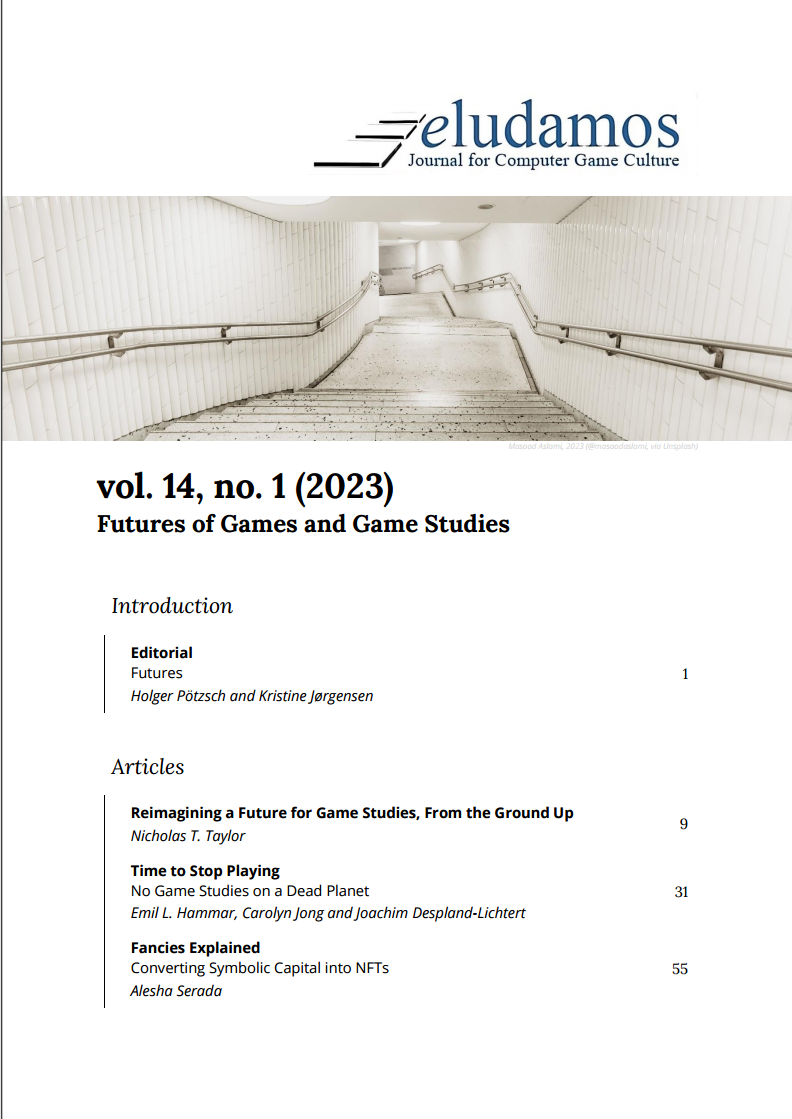Game worker solidarity
Mapping collective actions in the video games industry
DOI:
https://doi.org/10.7557/23.7342Keywords:
Game worker, worker organising, trade unions, solidarityAbstract
This commentary discusses the Game Worker Solidarity (GWS) Project. It documents instances of collective action in the games industry, presenting the data in a map and accompanying database. The aim of the project is to facilitate sharing information on the emergent movement for unionisation in the games industry after 2018, as well as archiving the longer history of worker resistance. We argue that understanding worker organisation—both the existing forms of collective action as well as the potential in the future—is vital for understanding the future of games and game production.
References
Alberti, G. (2016). Mobilizing and bargaining at the edge of informality: “The 3 cosas campaign” by outsourced migrant workers at the University of London. Working USA: The Journal of Labour and Society, 19(1), 81–103. https://doi.org/10.1111/wusa.12228 https://doi.org/10.1111/wusa.12228
Bulut, E. (2015). Glamor above, precarity below: Immaterial labor in the video game industry. Critical Studies in Media Communication, 32(3), 193–207. https://doi.org/10.1080/15295036.2015.1047880 https://doi.org/10.1080/15295036.2015.1047880
Chung, S. W., & Kwon, H. (2020). Tackling the crunch mode: The rise of an enterprise union in South Korea’s game industry. Employee Relations: The International Journal, 42(6), 1327–1352. https://doi.org/10.1108/ER-10-2019-0382 https://doi.org/10.1108/ER-10-2019-0382
Cohen, N. S., & De Peuter, G. (2020). New media unions: Organizing digital journalists. Routledge. https://doi.org/10.4324/9780429449451
Cote, A. C., & Harris, B. C., (2021). The cruel optimism of “good crunch”: How game industry discourses perpetuate unsustainable labor practices. New Media & Society, 25(3), 609–627. https://doi.org/10.1177/14614448211014213 https://doi.org/10.1177/14614448211014213
De Peuter, G., & Young, C. J. (2019). Contested ormations of digital game labor. Television & New Media, 20(8), 747–755. https://doi.org/10.1177/1527476419851089 https://doi.org/10.1177/1527476419851089
Dyer-Witheford, N., & de Peuter, G. (2009). Games of empire: Global capitalism and video games. University of Minnesota Press.
Kelmore, A. (2019, January 23). Why we are unionising Britain games industry. IWGB Game Workers. https://www.gameworkers.co.uk/why-we-are-unionising-the-uk-games-industry
Kirkpatrick, G. (2013). Computer games and the social imaginary. Polity Press.
Legault, M. -J., & Weststar, J. (2021). Organising challenges in the era of financialisation: The case of videogame workers. Work Organisation, Labour & Globalisation, 15(2), 7–24. https://doi.org/10.13169/workorgalaboglob.15.2.0007 https://doi.org/10.13169/workorgalaboglob.15.2.0007
Moody, J., & Kerr, A. (2021). What’s the score? Surveying game workers in Ireland 2020. SocArXiv. https://doi.org/10.31235/osf.io/zshk5 https://doi.org/10.31235/osf.io/zshk5
Ness, I. (2014). Against bureaucratic unions: US working-class insurgency and counteroffensive. In I. Ness (Ed.), New forms of worker organization: The syndicalist and autonomist restoration of class struggle unionism, (pp. 258–278). PM Press.
Ozimek, A. M. (2019). The “grey area” of employment relations in the Polish videogame industry. International Journal of Cultural Studies, 22(2), 298–314. https://doi.org/10.1177/1367877918821238 https://doi.org/10.1177/1367877918821238
Prado, J. (2018, March 30). Prospects for organizing the tech industry. Notes from Below. https://notesfrombelow.org/article/prospects-for-organizing-the-tech-industry
Ruffino, P. (2021). Workers’ visibility and union organizing in the UK videogames industry. Critical Studies in Media Communication, 39(1), 15–28. https://doi.org/10.1080/15295036.2021.1985157 https://doi.org/10.1080/15295036.2021.1985157
Ruffino, P., & Woodcock, J. (2021). Game workers and the empire: Unionisation in the UK video game industry. Games and Culture: A Journal of Interactive Media, 16(3), 317–328. https://doi.org/10.1177/1555412020947096 https://doi.org/10.1177/1555412020947096
Tan, J. S., & Nedzhvetskaya, N. (2020). Collective action in tech. Collective Action In Tech. https://github.com/collective-action/tech
Tan, J. S., Nedzhvetskaya, N., & Chan, W. (2022, January 3). 2021: A year of resilience in tech. Collective Action in Tech. https://collectiveaction.tech/2022/2021-a-year-of-resilience-in-tech
Weststar, J. (2015). Understanding video game developers as an occupational community. Information, Communication and Society, 18(10), 1238–1252. https://doi.org/10.1080/1369118X.2015.1036094 https://doi.org/10.1080/1369118X.2015.1036094
Weststar, J., & Legault, M. -J. (2017). Why might a videogame developer join a union? Labor Studies Journal, 42(4), 295–321. https://doi.org/10.1177/0160449X-17731878 https://doi.org/10.1177/0160449X17731878
Weststar, J., & Legault, M. -J. (2019). Building momentum for collectivity in the digital game community. Television & New Media, 20(8), 848–861. https://doi.org/10.1177/1527476419851087 https://doi.org/10.1177/1527476419851087
Woodcock, J. (2016). The work of play: Marx and the video games industry in the United Kingdom. Journal of Gaming and Virtual Worlds, 8(2), 131–143. https://doi.org/10.1386/jgvw.8.2.131_1 https://doi.org/10.1386/jgvw.8.2.131_1
Woodcock, J. (2019). Marx at the arcade: Consoles, controllers, and class struggle. Haymarket Books.
Woodcock, J. (2020a). Organizing in the game industry: The story of game workers unite UK. New Labor Forum, 29(1), 50–57. https://doi.org/10.1177/109579601-9893315 https://doi.org/10.1177/1095796019893315
Woodcock, J. (2020b). How to beat the boss: Game workers unite in the UK. Capital and Class, 44(4), 523–529. https://doi.org/10.1177/0309816820906349 https://doi.org/10.1177/0309816820906349
Downloads
Published
How to Cite
Issue
Section
License
Copyright (c) 2023 Austin Kelmore, Jamie Woodcock

This work is licensed under a Creative Commons Attribution 4.0 International License.







